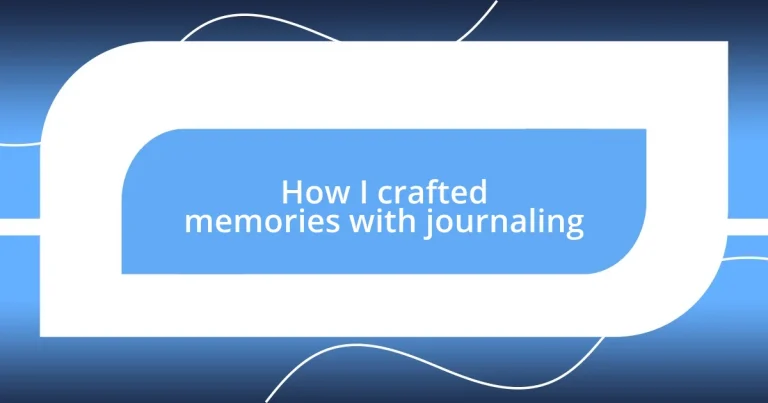Key takeaways:
- Journaling transforms fleeting thoughts into lasting memories, providing clarity and a deeper connection to self through reflection.
- Choosing the right journaling method—such as bullet journaling or free writing—enhances the experience and allows for personal expression.
- Reflecting on journal entries fosters growth, gratitude, and meaningful connections with others, enriching the journaling journey.
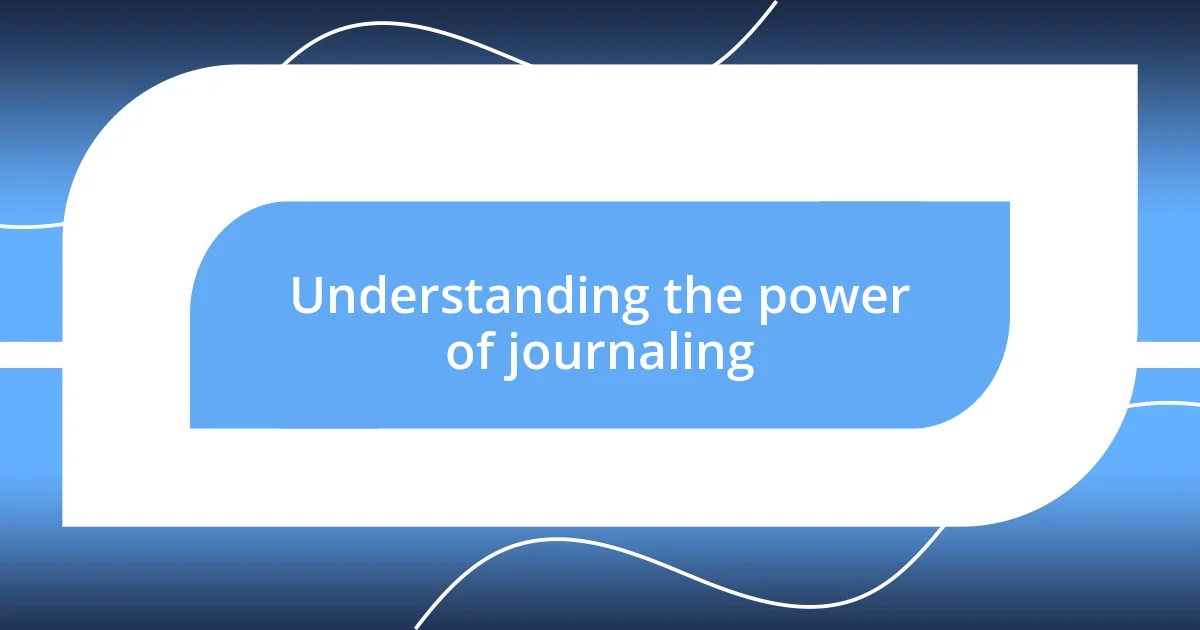
Understanding the power of journaling
Journaling has a remarkable ability to transform fleeting thoughts into tangible memories. I remember vividly how, after a challenging day, putting pen to paper allowed me to unravel my emotions. It’s as if the simple act of writing helped me process experiences, laying bare my feelings and thoughts in a way that mere reflection couldn’t achieve.
Consider this—how often do we let moments slip by without truly acknowledging them? During a particularly joyous summer, I began journaling my adventures. In revisiting those entries, I felt the warmth of the sun, the laughter of friends, and the thrill of spontaneous road trips all over again. It’s incredible how journaling helps maintain those vivid snapshots of life, allowing us to relive them long after they’ve passed.
The cathartic spell of journaling doesn’t just preserve our memories; it also fosters a deeper connection with ourselves. I often ask myself, what would I do without that quiet time spent reflecting on my day? Each time I write, I forge a stronger bond with my thoughts, revealing insights that might otherwise remain hidden. Ultimately, journaling becomes not just a record of experiences, but a powerful tool for self-discovery and understanding.
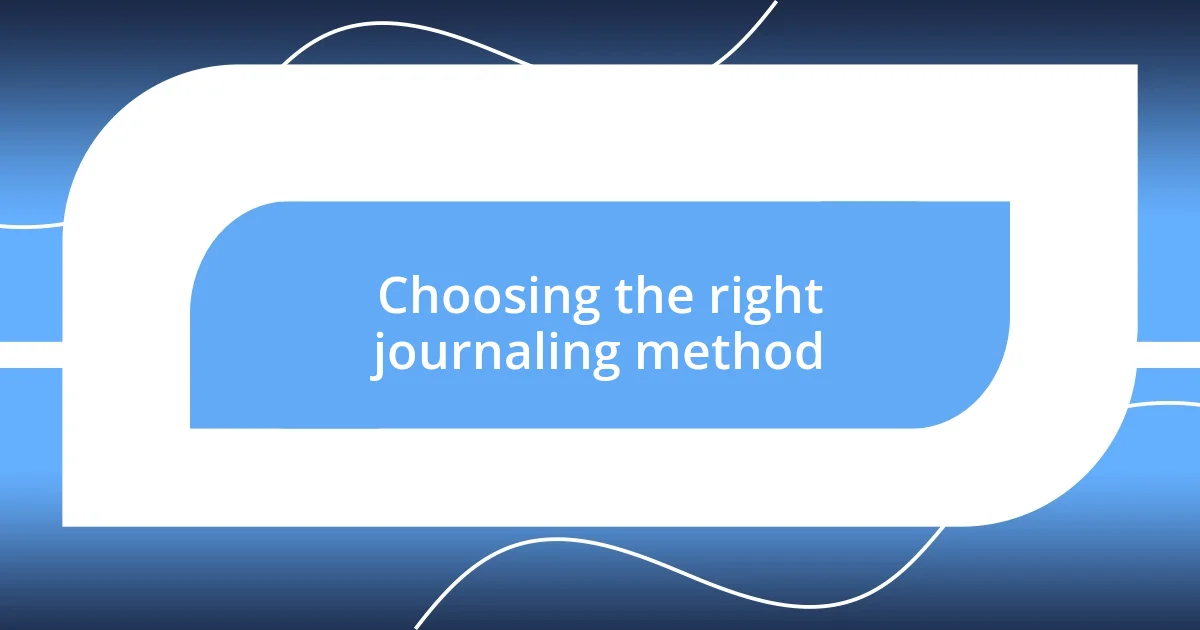
Choosing the right journaling method
Choosing the right journaling method can make all the difference in how you capture and reflect on your experiences. I found this out when I experimented with different styles—ranging from bullet journaling to expressive free writing. Each method resonated with me in unique ways; for example, the structure of bullet journaling kept me organized, while free writing allowed my thoughts to flow without restraint.
Here are some methods to consider when selecting your journaling style:
- Bullet Journaling: A highly organized approach, perfect for tracking goals and daily tasks.
- Free Writing: A stream-of-consciousness style that helps unleash creativity and raw emotion without restrictions.
- Gratitude Journals: Focusing on what you’re thankful for can shift your mindset and highlight positive experiences.
- Art Journaling: Combine visuals and text for a creative outlet that nurtures your artistic side while capturing memories.
- Prompt Journaling: Using specific questions or themes helps guide your writing, making it easier to reflect on particular areas of your life.
Finding the right method can take some trial and error. When I switched from a structured approach to a more spontaneous manner of journaling, I truly felt the freedom in my expression. It was like a door opened, letting in fresh air and new ideas that had long been stifled.
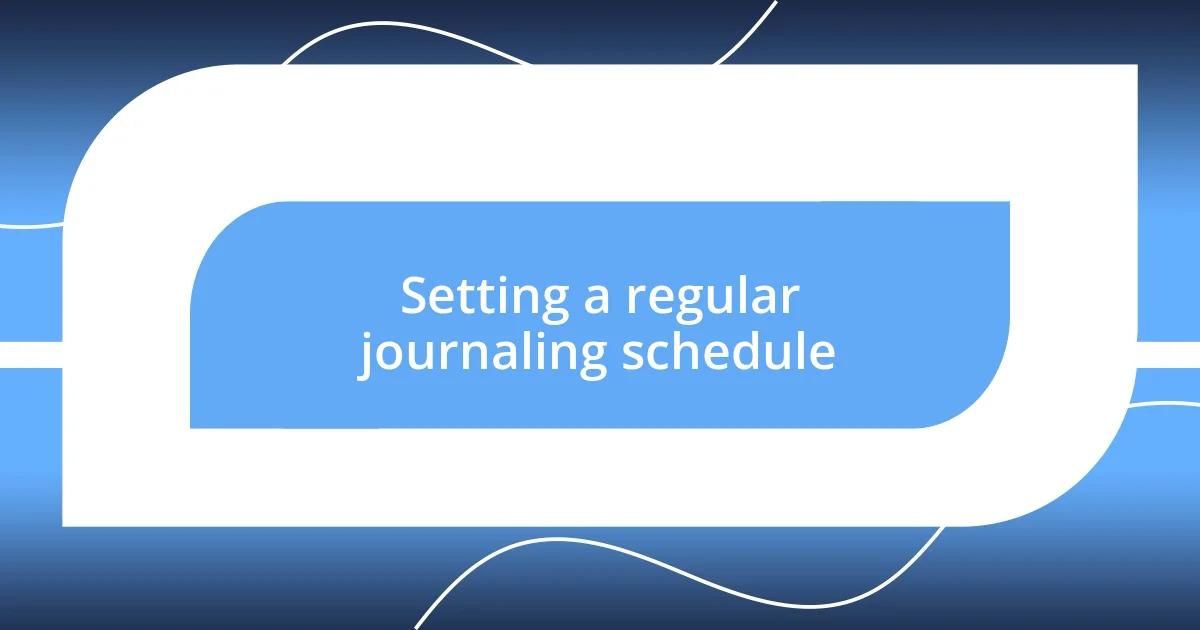
Setting a regular journaling schedule
Setting a regular journaling schedule can be a game changer. I remember the first time I committed to journaling each morning; it felt like an intimate ritual that carved out a space just for me. Whether I jotted down dreams, canned reflections, or plans for the day, I discovered that consistency transformed my journaling experience from an occasional activity into a fundamental part of my daily routine.
Something I’ve noticed is that finding a specific time helps me establish that habit. For instance, when I began writing right after breakfast, I found that those early morning thoughts flowed more freely. I often thought about how the day would unfold while my coffee brewed. Have you ever tried pairing journaling with another daily routine? It seems to create a seamless connection that makes it less of a chore and more of a pleasure, turning moments of mundane into meaningful reflection.
Ultimately, flexibility can be just as important as consistency. Some days I write for just five minutes, while others, when inspiration strikes, I could fill pages. This ebb and flow keeps the experience refreshing and engaging. I’ve learned to embrace the unpredictability, realizing that journaling isn’t about perfection but about honoring my thoughts and capturing the essence of each moment.
| Benefits of Consistency | Flexibility in Journaling |
|---|---|
| Establishes a routine | Allows freedom of expression |
| Enhances reflection | Adapts to varying moods |
| Creates a dedicated space for thoughts | Prevents burnout |
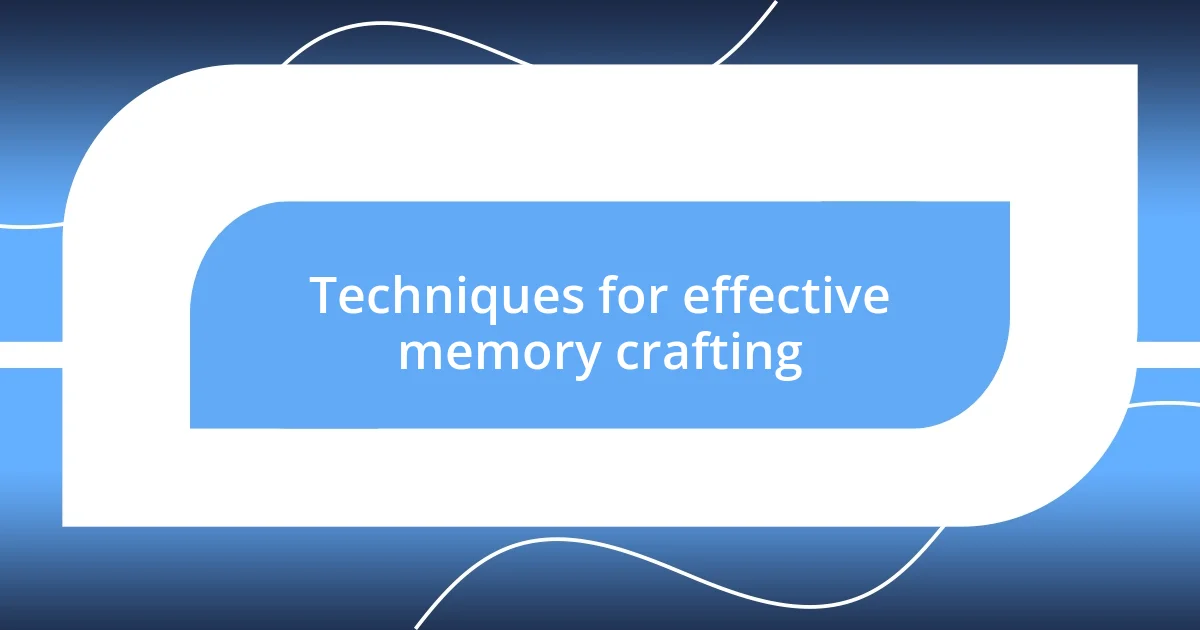
Techniques for effective memory crafting
Crafting memories through journaling can be deeply personal, and one technique that has transformed my practice is using sensory details. I often find that describing the sights, sounds, and smells surrounding a moment—like the fresh aroma of a pumpkin spice latte on a chilly fall day—helps to lock in that memory with vibrant clarity. Have you ever noticed how recalling a specific scent can instantly transport you back in time? It’s these rich, sensory descriptions that make my entries feel alive and unforgettable.
Another effective technique I’ve embraced is themed journaling. For a while, I dedicated certain days to specific themes, such as “Joyful Moments” or “Lessons Learned.” This approach allowed me to explore my life from different angles and provided an opportunity to reflect deeply on those experiences. When I focused on gratitude, my entries turned into a treasure trove of positivity, reminding me of the beauty nestled within everyday life. How often do we pause to appreciate the little things? This practice opened my eyes and heart to the small joys I might have overlooked otherwise.
Finally, addressing yourself in the journal can be a profound technique. I often write letters to my future self or even to the younger version of me. It feels like a conversation across time, allowing me to offer advice, encouragement, and a sense of connection to my past and future. This method not only enriches my journaling experience but also fosters a deeper understanding of my growth. Have you ever tried giving yourself a pep talk on paper? It can be surprisingly uplifting, making the act of journaling feel like a sacred dialogue with yourself.
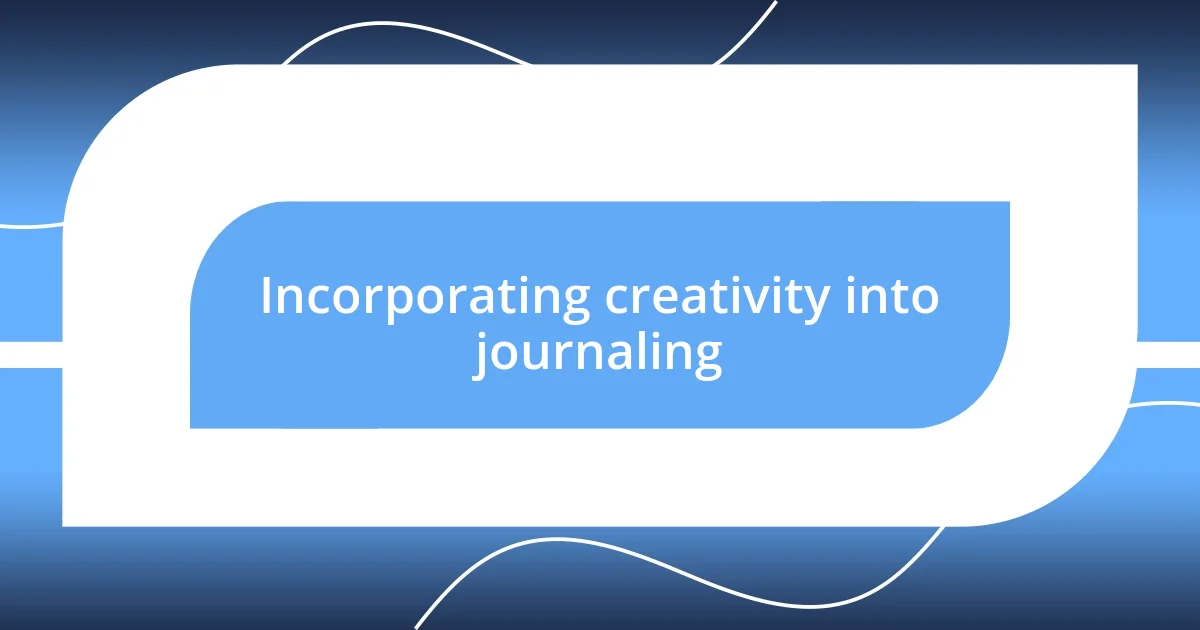
Incorporating creativity into journaling
Incorporating creativity into my journaling practice has added layers of depth and enjoyment I never anticipated. One day, feeling particularly inspired, I decided to doodle alongside my words. It was a simple sketch of the tree outside my window, but it transformed my page into a vibrant tapestry of thoughts and feelings. Have you ever felt that surge of creativity while journaling? It’s like opening a door to a more expressive version of yourself.
I’ve also experimented with different writing prompts to keep my entries fresh and engaging. For instance, I once dedicated a week to writing about my favorite childhood memories. Diving into nostalgia brought back vivid images, and the excitement of each recall added a playful twist to my journaling. It was as if I was hugging my younger self and reminiscing about the good old days. How often do we let those joyful memories resurface? It’s a delightful journey worth embarking on.
Music is another creative element I’ve woven into my journaling. Sometimes, I’ll play a soothing playlist while I write, allowing the melodies to inspire my thoughts. On particularly challenging days, I’ll even jot down the lyrics of a song that resonates with me, capturing the emotions it evokes. Have you considered how music can set the mood for your reflections? It creates an atmosphere that nurtures creativity and helps me articulate feelings I didn’t even realize I had.
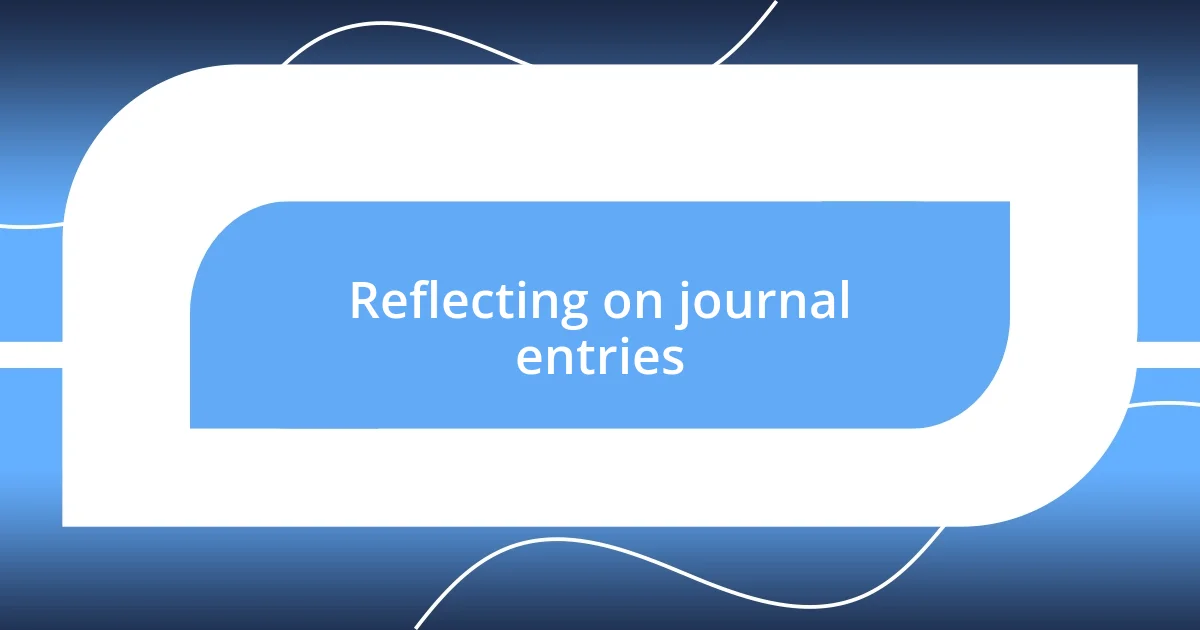
Reflecting on journal entries
Reflecting on my journal entries has often felt like flipping through the pages of my life. Each entry serves as a time capsule, inviting me to revisit emotions and thoughts that I might have long buried. There’s something profound about reading my past struggles or joys; it’s like having a heart-to-heart with my former self. Have you ever felt that rush of nostalgia as you read something you wrote years ago?
Sometimes, I find myself surprised by my own insights. I often reread entries written during challenging moments, and I see how far I’ve come. For instance, one entry chronicled a particularly difficult phase at work—my anxieties seemed insurmountable back then. Yet as I reflected on it later, I noticed how I navigated that storm and emerged stronger. Doesn’t it feel rewarding to witness your own growth in such raw detail?
The act of reflecting allows me to embrace gratitude wholeheartedly. I remember one journal session where I listed simple pleasures—like the laughter of friends or the warmth of the sun on my skin. Reading that list reminded me to cherish those fleeting moments. It’s like uncovering a treasure map in my own writing, guiding me to appreciate the little things in life. How often do you look back and realize those small joys are what truly enrich our existence?
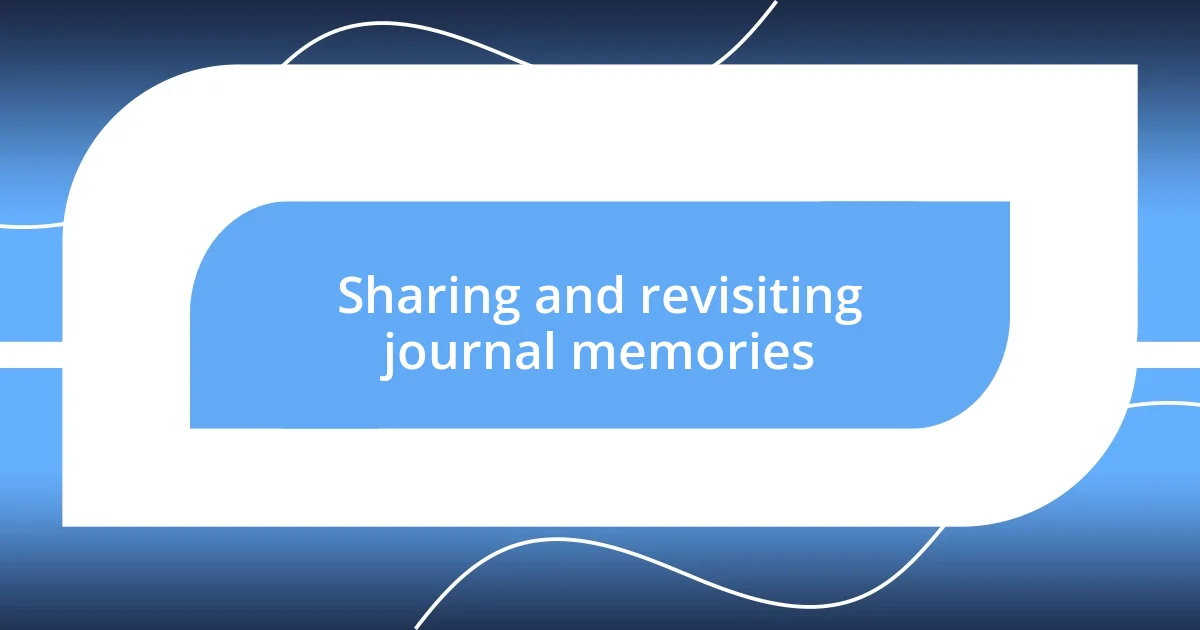
Sharing and revisiting journal memories
Sharing my journal memories with friends and loved ones has been one of the most rewarding aspects of my writing journey. I still recall a cozy evening when I shared snippets from an entry detailing my travel experiences—a mixture of awe, fear, and adventure. As I read aloud, I could see their eyes light up, and it sparked a lively discussion about their own travel tales. It’s fascinating how sharing personal insights can create bonds through shared experiences. Have you ever felt that connection when recounting a cherished memory?
Revisiting journal entries often feels like walking down a familiar path, one I’ve traveled alone but choose to share. I remember revisiting an entry about my first public speaking experience—each nervous detail was captured in ink. When I chose to share that moment at a gathering, I was met with empathy and encouragement. It reminded me that my story could inspire others, turning a personal challenge into collective strength. Isn’t it amazing how vulnerability can foster community?
I often find myself rediscovering joy in my journal through shared reflections. There’s a particular entry where I wrote about a surprise birthday party thrown for me by my closest friends. Re-reading it fills me with that same warmth and gratitude. Have you ever noticed how reminiscing about joyful moments can brighten a dull day? By sharing these memories, I not only relive those emotions but also encourage others to create their own memorable moments. It underscores the beauty of our shared human experience, doesn’t it?












